Venice made national and international headlines last week with the news that its resident population had fallen below 50,000 for the first time, a stark symbol of the city’s metamorphosis from thriving metropolis to tourist playground.
There was some initial confusion as to the source of the figure: a widely-shared story from news agency Ansa said that Venice City Hall (the Comune di Venezia)’s statistics office had recorded its population size as 49,997 on August 10th – but when contacted by The Local, the comune denied having provided any such information, and said its most up-to-date population stats only cover up to July 31st.
Instead, the number appears to have come from Venessia, a Venice-based activist group which maintains a (de)population counter based on provisional updates from the civil registry office that have yet to be vetted.
The counter put the city’s population below the 50,000 threshold on August 10th; as of Thursday, the number had dropped to 49,989.
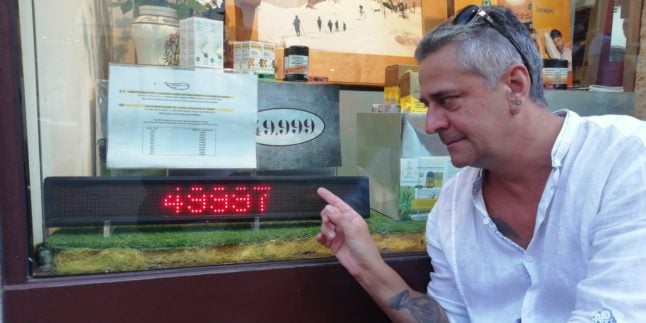
The exact moment when Venice lost its 50,000th resident may be lost to history, but what’s undeniable is that the city’s permanent population is disappearing at an alarming rate, from over 174,000 in 1951 to less than a third of that today. Meanwhile, its tourist numbers continue to break records.
“I feel like a stranger in my own home,” says Matteo Secchi, a native Venetian who leads the Venessia.com group and runs its website.
“I live near the Rialto Bridge, and there are no more Venetians there, only foreigners. Not that there’s anything wrong with foreigners…. we are open to all cultures, but we would like ours to survive too.”
READ ALSO: Mass tourism is back in Italy – but the way we travel is changing
Secchi currently works on a hotel reception desk after his own B&B went under during the pandemic – an irony which, given Venessia’s emphasis on the damage inflicted by the tourist industry on the city, is not lost on him.
“Everyone works in the tourism sector here,” he says matter-of-factly.
It’s not that tourism is an inherent evil, says Secchi, acknowledging that it’s made Venice rich; but its implacable hold on the city has driven up rents and property prices, causing ordinary shops and affordable accommodation to disappear.
“There are fewer of us all the time because you can’t live normally,” he says.
He compares modern-day Venice to Disneyland, saying he often feels like “a little monkey: people come and take photos and say, ‘look at this nut!'”. What young person wants to live their life as an unpaid theme park mascot?
OPINION: Why more of Italy’s top destinations must limit tourist numbers
In 2009, Secchi and the other Venessia organisers staged a mock funeral for Venice after its population dropped below 60,000. The spectacle involved rowing a pink coffin down the Grand Canal, flanked by several gondolas, and depositing it outside City Hall.
Though he’s proud of the demonstration and the attention it received (“The second-biggest news story out of Italy that year, after the Aquila earthquake!”) he has no plans hold another one this time, noting that of the five founding members of his organisation, he’s the only one still alive.
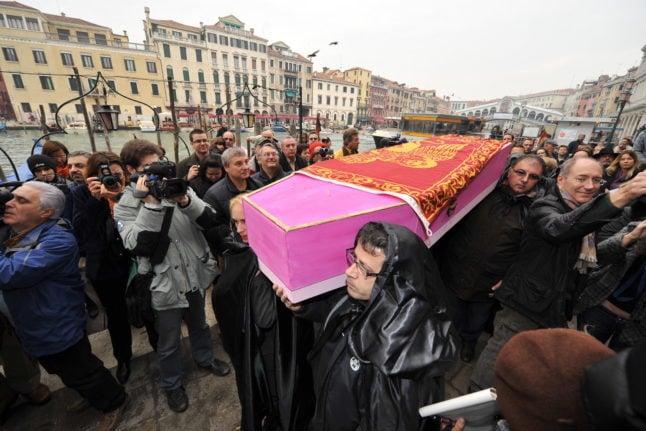
Venessia has a long list of recommendations for how to rebuild the city’s population, including giving tax breaks to all non-tourism businesses, offering financial incentives for landlords to rent to residents rather than tourists, and having a ten-year moratorium on building tourist accommodation (“Do you think the comune would agree to this?” I ask of the latter. “No!” Secchi chuckles).
One of the organisation’s more realistic proposals is levying a tax on tourist rentals to finance the renovation of Venice’s dilapidated public housing, much of which stands curiously empty for a city with some of the highest rents and real estate values in the country.
READ ALSO: ‘The myth of Venice’: How the Venetian brand helps the city survive
There’s no easily accessed public record of exactly how many empty public housing units there are in Venice, but the issue was the subject of a Vice documentary in the early days of the pandemic, when some restaurant and hotel workers suddenly out of a job were forced to squat in abandoned buildings unfit for human habitation.
Secchi becomes particularly animated on this point. “It’s very interesting – these numbers now form the basis of our protest, we’re going to focus on them. It’s been years that we’ve been saying ‘ah, there are all these empty homes’, but we’ve never got official figures.”
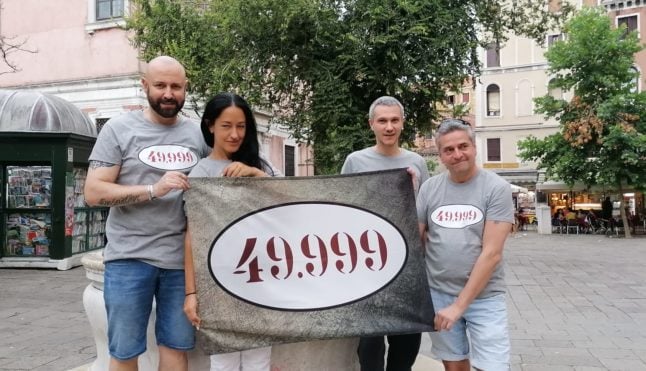
While the activist is frustrated with the comune‘s inaction in the face of what he sees as a slow-motion catastrophe, Secchi doesn’t think the city’s current leaders are worse than its any of its previous ones.
“In the past 40 years, there hasn’t been an administration capable of handling this issue,” he says.
A quality they all tend to share, in Secchi’s view, is that they have a “coda di paglia” – literally, a ‘straw tail’; an expression that refers to a person who is highly defensive in response to any criticism.
When the latest population figures made the headlines, the comune were quick to dismiss the issue as a false alarm, saying that the numbers fail to take into account all the students and temporary workers who live in the city without being registered residents.
READ ALSO: How will the new tourist-control system work in Venice?
Secchi rejects the notion that these people in these categories count as Venetians, arguing that a community is made up of individuals who put down roots, not those who pass through for a few months or years.
But if they want to view the issue purely in terms of numbers, he says, by their own logic the comune should take into account all the people who falsely claim Venice as their primary residence in order to evade the inflated property taxes that come with second home ownership, but in reality live elsewhere most of the year.
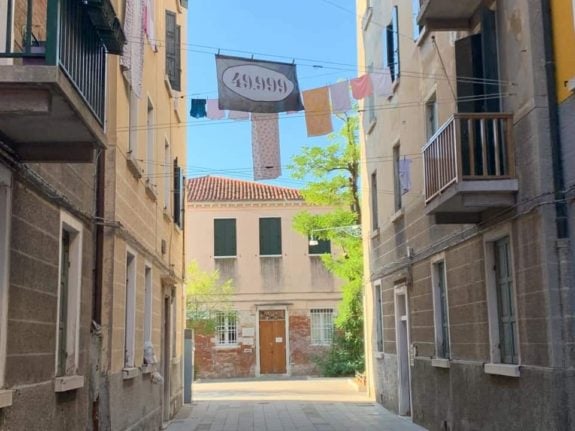
A banner on a washing line bears the number 49,999. Venessia began a countdown publicity campaign to highlight the city’s population decline several months ago. Credit: Venessia.com
Venice has recently taken one step to address its over-tourism problem, with the announcement by Mayor Luigi Brugnaro at the start of July that the city will impose a long-discussed tourist tax of €3-€10 for day-trippers from January 2023.
Whether the tax will have any real calming effect on tourism, or be used to benefit residents in a way that might help rebuild their numbers, remains to be seen.
“We’re in favour of freedom, but we also want to defend our identity,” says Secchi.
“We’re not fighting for anything strange; we’re fighting for our survival.”

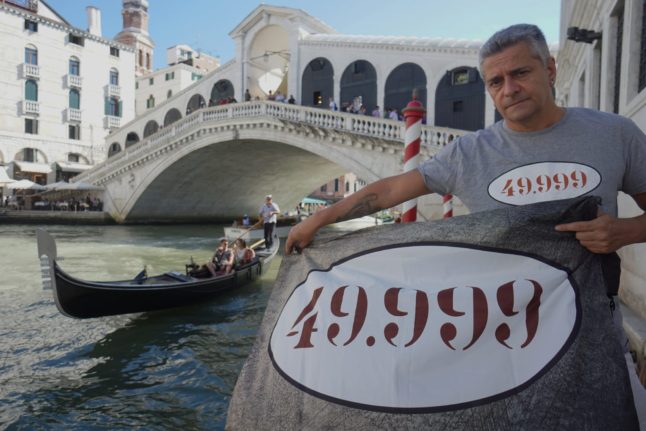
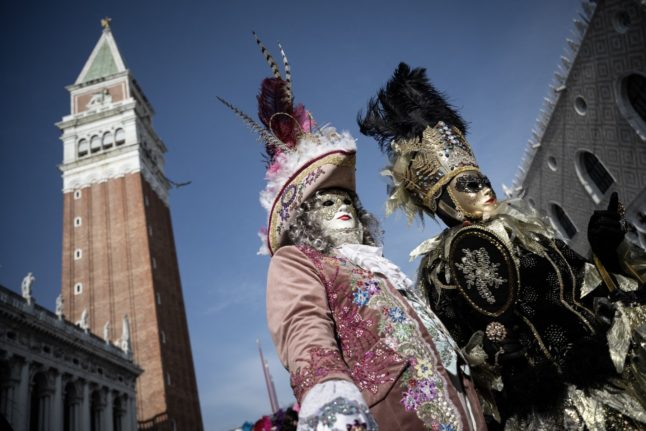
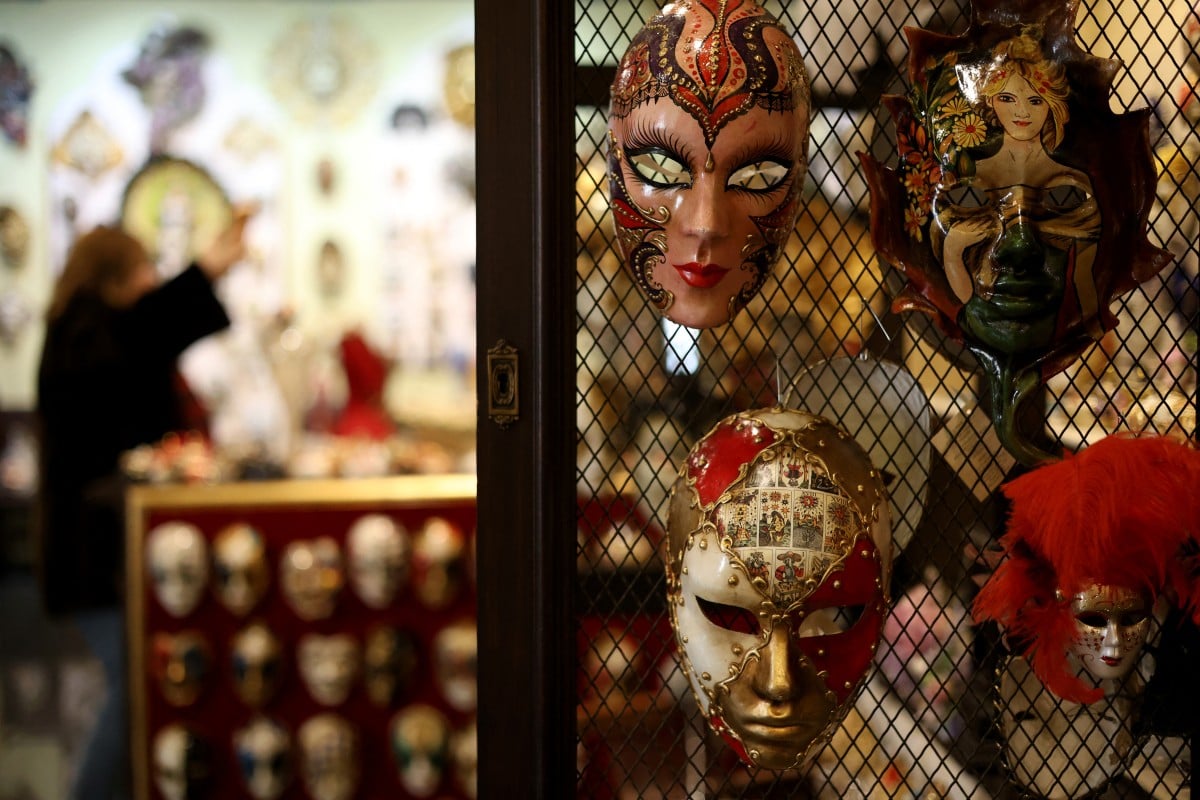
 Please whitelist us to continue reading.
Please whitelist us to continue reading.
Member comments